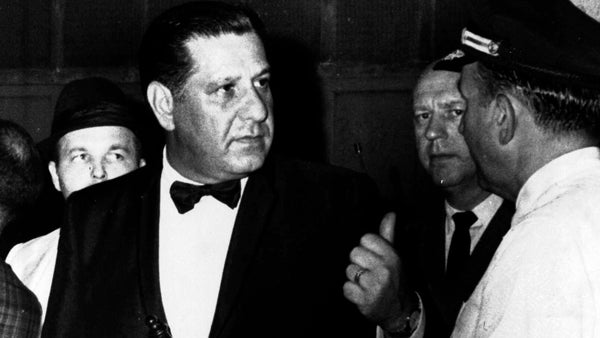Film recalls Rizzo in all his larger-than-life, divisive dimensions

Frank Rizzo was seen with a nightstick tucked into his cummerbund as he directed police officers in Philadelphia, in this June 13, 1969 photo. (AP Photo)
People of a certain generation know where they were when Kennedy was assassinated. I know where I was when I heard Frank Rizzo had died.
Rizzo was that big a figure for a couple of generations of Philadelphians – a controversial, tough-talking police commissioner who became a two-term mayor in the 1970’s. It was a time when the counter culture was blooming, black political empowerment was on the rise, and working-class Philadelphia was losing jobs by the tens of thousands.
Rizzo was a huge, imposing man of great physical courage (as an off-duty police captain in 1953 he stopped his car at 2 a.m. to take on three men beating a streetcar motorman) and natural charisma. He spoke out against radicals and thugs and up for “the little guy.” To many, that meant Rizzo was for rowhouse whites and against blacks and liberals.
Few politicians ever inspired such devotion and contempt.
Rizzo won election to the mayor’s office in 1971 and re-election in 1975, but found his second term marred by a powerful recall effort, an embarrassing episode in which he failed a lie-detector test for the Daily News about a political deal, and voters rejecting a City Charter change he sought so he could run for a third term.
He left after two terms, and was free under the charter to run again later. He tried three more times, becoming a less harshly-polarizing figure as time went on. He never won the mayor’s office again, but died a winner of sorts. He fell in his office from a heart attack during the summer of the 1991 campaign, having won a three-way Republican primary and facing Democrat Ed Rendell in November.
His supporters still talk about how Broad Street was lined with thousands of people, many African-American, watching his funeral cortege make its way though the city to his final resting place.
Hear the man himself
Frank Rizzo is at the heart of the fourth episode in a twelve-part video history of Philadelphia being produced and co-directed by Sam Katz, the former school board member, mayoral candidate and now chairman of the state board overseeing the city’s finances.
There’s nothing quite like hearing and seeing Rizzo again.
“That fringe, cuckoo group we have in any community don’t represent one thing,” Rizzo says in the audio clip above, from the documentary, called, “The Fight.” He’s followed in that clip by former City Councilwoman Augusta Clark.
Katz was a young man when Rizzo was mayor, but in 1991, he was one of the two Republican primary candidates Rizzo beat in that last run for City Hall.
“I got to know him much better later in his life,” Katz said, “by which time I think he had largely mellowed and was looking at things from the vantage an older, more experienced and less bombastic guy. But his presence still filled up the room.”
Amen. I got to know Rizzo in the 80’s and as much harm as I thought he did as mayor – on issues of taxes, services, labor relations and management as much as race – I just couldn’t help but like him.
My one complaint about this episode is that it leaves me wanting more. In a half an hour, it covers Rizzo, the loss of the city’s manufacturing base, the city’s sports triumphs and the Gamble & Huff Philly sound. It needed an hour, I told Katz.
Yeah, yeah, he said. But later this year, he’ll produce the chapter in the story that follows Rizzo and combine that with the one that proceeds him for a feature-length documentary. I’ll look forward to that.
I asked Katz what he thinks Rizzo’s legacy is.
“There’s no question in my mind that Rizzo knew exactly what he felt about everything,” Katz said. “He took sides on every issue. That tended to divide us, and I think progress in a city is harder to achieve when people are divided, and feel our leaders are not trying to lead everyone.”
You can watch “The Fight” tonight on Channel 6 at 7:30. Later, you can view it online at HistoryofPhilly.com.
WHYY is your source for fact-based, in-depth journalism and information. As a nonprofit organization, we rely on financial support from readers like you. Please give today.

